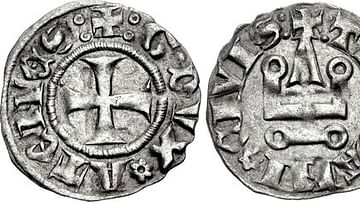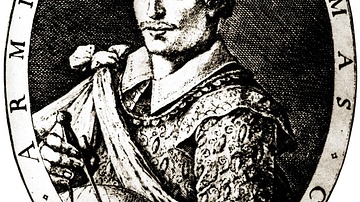Search Definitions
Browse Content (p. 112)

Definition
Duchy of Athens
The Duchy of Athens was a Latin or Frankish state in Greece that existed from 1205 to 1458 CE. It was created in the aftermath of the Fourth Crusade (1202-1204 CE) and would be ruled for the majority of its history by the Burgundian de la...

Definition
Thomas Cavendish
Thomas Cavendish (1560-1592 CE) was an Elizabethan mariner and privateer who famously circumnavigated the globe in 1586-88 CE, only the third voyage to do so and the first to set sail with that specific intention. Returning rich from Spanish...

Definition
St. Anthony's Fire
St. Anthony's Fire (SAF) is an illness brought on by the ingestion of fungus-contaminated rye grain causing ergot poisoning (ergotism). The disease's common name derives from the medieval Benedictine monks dedicated to that saint who offered...

Definition
Xunzi
Xunzi (pronounced shund-zee, l. c. 310-c. 235 BCE) was a Confucian philosopher of the Warring States Period (c. 481-221 BCE) in China. He is also known as Hun Kuang, Hsun Tzu, Xun Tzu, and Xun Kuang. Xunzi translates as Master Xun and is...

Definition
English Reformation
The English Reformation began with Henry VIII of England (r. 1509-1547 CE) and continued in stages over the rest of the 16th century CE. The process witnessed the break away from the Catholic Church headed by the Pope in Rome. The Protestant...

Definition
Teng Shih
Teng Shih (l. c. 500 BCE) was a Chinese Sophist and lawyer who lived and wrote in the province of Cheng (Pengcheng, modern-day Xuzhou, Jiangsu province) during the era of the Spring and Autumn Period (c. 772-476 BCE) which preceded the Warring...

Definition
Oldowan Tools
The appearance of simple stone tools, widely known as Oldowan tools or the Oldowan industry, marked the beginning of our technological revolution. To our knowledge, these artifacts appeared around 2.6 million years ago in the savannahs of...

Definition
Sun-Tzu
Sun Tzu (l. c. 500 BCE) was a Chinese military strategist and general best known as the author of the work The Art of War, a treatise on military strategy (also known as The Thirteen Chapters). He was associated (formally or as an inspiration...

Definition
Lao-Tzu
Lao-Tzu (l. c. 500 BCE, also known as Laozi or Lao-Tze) was a Chinese philosopher credited with founding the philosophical system of Taoism. He is best known as the author of the Laozi (later retitled the Tao-Te-Ching translated as “The Way...

Definition
Mencius
Mencius (l. 372-289 BCE, also known as Mang-Tze or Mang-Tzu) was a Confucian philosopher during The Warring States Period in China (c. 481-221 BCE) and is considered the greatest after Confucius himself for his interpretation, formulation...